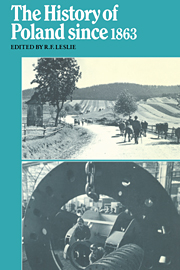Book contents
- Frontmatter
- Contents
- List of maps
- Preface to the paperback edition
- Abbreviations
- Map 1 Poland in the nineteenth century
- 1 Triloyalism and the national revival
- 2 Poland and the crisis of 1900–7
- 3 Poland on the eve of the First World War
- 4 The emergence of an independent Polish state
- 5 The breakdown of parliamentary government
- 6 Piłsudski in power, 1926–35
- 7 Poland without Piłsudski
- 8 Poland in defeat, September 1939–July 1941
- 9 The ill-fated alliance, August 1941–April 1943
- 10 The years of Tempest, May 1943–December 1944
- 11 Post-war Poland
- 12 The rise and ebb of stalinism
- 13 The October turning point
- 14 ‘The little stabilization’
- 15 The decline of Gomułka
- 16 Poland under Gierek
- 17 Polish society, 1945–75
- Epilogue: The rise and fall of Solidarity
- Notes
- Select bibliography
- Index
4 - The emergence of an independent Polish state
Published online by Cambridge University Press: 26 December 2009
- Frontmatter
- Contents
- List of maps
- Preface to the paperback edition
- Abbreviations
- Map 1 Poland in the nineteenth century
- 1 Triloyalism and the national revival
- 2 Poland and the crisis of 1900–7
- 3 Poland on the eve of the First World War
- 4 The emergence of an independent Polish state
- 5 The breakdown of parliamentary government
- 6 Piłsudski in power, 1926–35
- 7 Poland without Piłsudski
- 8 Poland in defeat, September 1939–July 1941
- 9 The ill-fated alliance, August 1941–April 1943
- 10 The years of Tempest, May 1943–December 1944
- 11 Post-war Poland
- 12 The rise and ebb of stalinism
- 13 The October turning point
- 14 ‘The little stabilization’
- 15 The decline of Gomułka
- 16 Poland under Gierek
- 17 Polish society, 1945–75
- Epilogue: The rise and fall of Solidarity
- Notes
- Select bibliography
- Index
Summary
The first year of the war
The war began in 1914 with German expectation of a quick victory in the west at least. In fact, the stabilization of the front in France after the Battle of the Marne revealed that the struggle would be a long one. The powers which had partitioned Poland now turned to the question of enlisting Polish support in the conflict which was to extend until 1918. None of the powers had clearly defined aims for Poland at the beginning of the war. The clearest objectives were those of Austria–Hungary, where there was widespread support for the incorporation of the Kingdom of Poland into the Habsburg empire and its union with Galicia as a third constituent portion of the monarchy. The Austrians, however, hesitated to make this aim public. The attempt of the Pole, Leon Biliński, the Austro-Hungarian minister of finance, to persuade the emperor Franz Joseph to issue a declaration in favour of the ‘Austro-Polish solution’ was unsuccessful. Nevertheless, on 12 August Berchtold, the Austrian Foreign minister, received a general promise from Germany that an Austro-Polish settlement would be looked upon with favour, a promise repeated, though in vague terms, at a conference between Austrian and German representatives at Poznań in January 1915. The Germans were on this occasion more interested in the division of the spoils in the Dabrowa basin which had fallen into the hands of the Central Powers (Germany and Austria–Hungary). The Hungarians objected to the concept. The plan put forward by the Austrian prime minister, Karl Sturgkh, in 1915 proposed only that the new Polish territories within the monarchy should enjoy the same autonomy as Galicia.
- Type
- Chapter
- Information
- The History of Poland Since 1863 , pp. 112 - 138Publisher: Cambridge University PressPrint publication year: 1980



